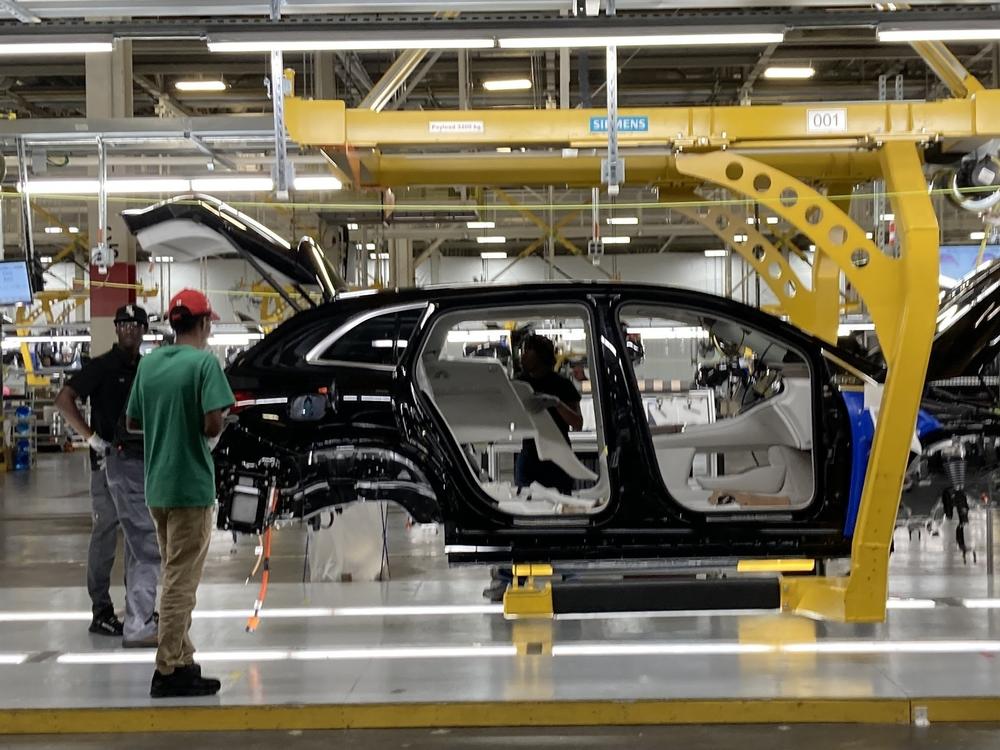Section Branding
Header Content
Here's one potential winner from the UAW strike: Non-union auto workers in the South
Primary Content
When German automaker Mercedes revealed plans to open a new assembly plant in the U.S. in 1993, 19 states started courting the luxury car maker.
Alabama was considered the dark horse. Its proposed site near Tuscaloosa had no major airport, the state had an unskilled workforce and high poverty.
But none of that scared away Mercedes when it chose Alabama that September. The unskilled workforce was low-cost and, crucially, not unionized. The southern states' union opposition and willingness to offer huge financial incentives has led to a foreign car making boom in the region.
Yet autoworkers in the South are watching the current UAW strikes closely. They're left out of the negotiations and any benefits that could come out of them.
But if the United Auto Workers union secures a big bump in pay for their members, the region's foreign auto makers would also likely provide their own raises to stay competitive. It would make the UAW much more attractive in the South, which makes the companies nervous.
"Workers feel that they're going to get the same thing that the UAW is going to get," Morris Mock, a technician at a Nissan plant near Jackson, Mississippi, said.
Southern draw: No unions and big $$ in incentives
Alabama didn't just win Mercedes over because it wasn't favorable to unions. The state also provided incentives of roughly $400 million. Other states in the South have dangled far greater baubles to lure foreign automakers since then. Last year, Georgia and local governments promised Hyundai $1.8 billion in tax breaks, new roads and other benefits in exchange for a new electric vehicle plant in the state.
The incentive war and the lack of unions have made the South the destination of choice for foreign automakers. BMW led the way when it announced a South Carolina plant in 1992. Honda and Hyundai followed Mercedes to Alabama. Nissan went just north of Jackson, Mississippi. Volkswagen chose Tennessee.
Auto workforce has ballooned to tens of thousands
The Biden Administration has also gotten in on the incentives game, this time to encourage foreign automakers to make more of their EVs in America. That could lead to new plants heading to Southern states, like the one in Georgia.
"If it's got to be in the United States it's going to be in the South," said A.J. Jacobs, a professor at East Carolina University and author of "The New Domestic Automakers in the United States and Canada" about the rise of foreign automaker plants in North America.
Jacobs said many of the deals states offered to these plants can pay for themselves over the course of decades when considering the tax revenue and jobs they generate. Alabama went from just a few hundred autoworkers in the early 1990's to about 47,000 today.
But Jacobs warns that these incentives aren't always worth it, especially now that they've shot well past the half billion mark. Just as important as the amount is which company a state is recruiting.
"If you told me that you gave away $500 million in incentives to get a Toyota factory, I'd say go for it," Jacobs said. "There's not too many companies in the world I would say that about. Because once Toyota builds a factory there it's staying. They're not going anywhere."
The South keeps UAW's negotiations in check
While Southern workers could see their wages rise with a UAW win, the North-South tug of war over wages goes both ways. The smaller paycheck in the South makes it harder for the UAW to negotiate for more money as the northern plants try to stay competitive with foreign automakers.
UAW workers are also striking for better pay and benefits at a Mercedes supplier in Alabama – one of the few unionized car part manufacturers in the region. The strike is unrelated to the national strike against the Big Three.
But paycheck size is not the only issue southern workers are paying attention to with the strike. There's also the global transition to electric vehicles.
The overhaul of old plants and construction of new ones to build EVs will create new jobs. But it will also cause the loss of other jobs. Car companies don't need workers trained to build engines for an EV that won't have one, said Mock.
It's still uncertain to Mock if the EV shift will be a net positive for southern workers. It will depend on what comes of the UAW contract, which could lead to similar changes at the foreign automakers' plants. Job security and retraining workers to fit the EV future is a big part of the UAW's fight for its members – and indirectly for southern auto workers too.
"This is one of the most important times in America," Mock said. "The most important times in the labor movement."
Copyright 2023 Gulf States Newsroom. To see more, visit Gulf States Newsroom.

